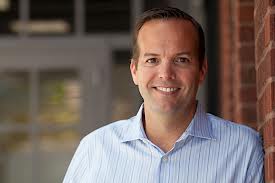Good morning, everyone! It looks like roughly 20 percent of you didn’t receive yesterday’s email. (Sorry. We’ve no clue what happened.) If you’d like to check out the entire newsletter, it’s here. If you’d prefer to read yesterday’s column alone, “Inside Mysterious Mithril Capital,” it’s here.
—–
Top News in the A.M.
With today’s Apple earnings expected to be ho-hum, does the company have a surprise up its sleeve?
Meet the One, OnePlus‘s $299 Nexus killer.
—–
Upstart Takes a Turn Into a Bigger Market
Two years ago, Upstart, a two-year-old, Palo Alto-based company debuted a newfangled funding platform that pairs accredited investors with students or recent graduates who are looking to finance their ideas. The idea, essentially: investors lend their own capital against the future earnings of the borrower, capital that is expected to repaid with interest within 10 years.
Though the peer-to-peer lending aspect isn’t novel, the way that Upstart assesses risk, which is tied directly to a borrower’s academic credentials, seemed to be.
Now, says Upstart, it’s using similar analysis to roll out a new and surprisingly old-fashioned product: three-year, $25,000 loans which will be assigned to people based not on their future earnings potential but their basic employability.
It’s a natural fit for the company. Not only is Upstart planning to target people without much work or credit history (a demographic it knows well), but it will be again be assessing those individuals’ risk profiles based on where they went to school and what they studied while there.
A Harvard graduate who majored in business, for example, might be assigned an annual percentage rate, or APR, of 6.5 percent, while someone who studied education at Bowling Green State University might be assigned an APR as high as 20 percent. (Those are lowest and highest ends of the loans’ range, respectively.)
The move isn’t a pivot, says CEO Dave Girouard, who says the business of funding future earnings is strong, with 30 percent more “Upstarts” on and backers on the company’s lending platform as last year.
Still, Girouard sounds even more enthusiastic in describing the market opportunity for traditional loans. By his account, most banks won’t touch anyone without a credit or employment background and neither will alternatives like LendingClub and Prosper, which creates an opening for Upstart.
Its window is limited. Girouard notes that once people drift into their 30s and 40s and gain employment histories that can be assessed by a broader spectrum of lenders, Upstart loses its advantages as an underwriter.
But that still leaves 20 million potential borrowers in the U.S. alone, and “there are a lot of places we could take this over time in terms of underwriting,” he adds.
Upstart has raised $7.6 million from Kleiner Perkins Caufield & Byers, NEA, First Round Capital, and Google Ventures, among others. It hasn’t raised any capital in the last year, though. Girouard says he expects to raise another round in the “second half of this year.”
New Fundings
Declara, a 1.5-year-old, Palo Alto, Ca.-based social learning platform that connects large numbers of people to massive amounts of content, has raised $16 million in Series A financing led by GSV Capital, with Data Collective, Founders Fund and Catamount Ventures joining the round.
Delivery Hero, a 3.5-year-old, Berlin-based online food delivery service, has raised $85 million in Series F funding led by an undisclosed investor that TechCrunch hears is Luxor Capital Group. The company has now raised roughly $285 million to date, including from Insight Venture Partners, Kite Ventures, Phenomen Ventures, Ru-net, Kreos Capital,Team Europe, WestTech Ventures, Point Nine and Tengelmann Ventures.
Everplans, a 1.5-year-old, New York-based company whose online platform is designed to help users create, securely store, and share important documents like wills, life insurance, and health information, has raised $2.07 million in a second round of seed funding. Participants include Scout Ventures, along with individual investors David McCabe and Mark Seelig. The company has raised roughly $3.45 million to date.
Guardant Health, a year-old, Redwood City, Ca.-based company whose blood test for cancer aims to replace standard tissue biopsies, has raised $30 million led by Khosla Ventures, which was joined in the round by earlier investor Sequoia Capital and new investor Pejman Mar Ventures. To date, the company has raised at least $40 million, shows Crunchbase.
HackSurfer, a 1.5-year-old, Glenelg, Md.-based data analytics company focused on cybercrime, has raised $3.5 million in funding led by Boulder Ventures and CNF Investments.
Piqora, a two-year-old, San Mateo, Ca.-based company that makes an enterprise level marketing and analytics suite, has raised $7.7 million in Series A funding led by Draper Fisher Jurvetson. Other participants in the round included Freestyle Capital, Baseline Ventures , Lazerow Ventures, Firebolt Ventures and Altos Ventures. The company has now raised $11 million altogether.
Principia Biopharma, a 5.5-year-old, South San Francisco-based company that’s developing advanced treatments for cancer and autoimmune diseases, has raised $50 million in new funding led bySofinnova Ventures. All of the company’s previous investors also participated in the funding, including Morgenthaler Ventures, New Leaf Venture Partners, OrbiMed, SR One and Mission Bay Capital.
Pure Storage, the 4.5-year-old, Mountain View, Ca.-based enterprise storage company, has raised $225 million in fresh funding led by previous institutional investors, including T. Rowe Price and Tiger Global, along with new investor Wellington Management. Earlier investors Greylock Partners, Index Ventures, Redpoint Ventures, and Sutter Hill Venturesalso participated in the round, which brings the company’s total capital raised to date to $470 million. Re/code has much more on the funding here.
Salesvue, a seven-year-old, Round Rock, Tex.-based mobile payment software company that targets mobile workers needing to process different types of payments, has raised $3 million led by Cultivation Capital, which was joined by a group of angel investors. The company has raised at least one, $600,000, round of funding prior, shows Crunchbase.
Sentinel Labs, a year-old, Palo Alto, Ca.-based cybersecurity startup, has raised $12 million in Series A funding led (in a twist) by late-stage investor Tiger Global Management. The company has now raised $14.5 million altogether, including from Granite Hill Capital Partners, Accel Partners, Data Collective, and UpWest Labs.
Weebly, an eight-year-old, San Francisco-based consumer service that lets people create a website, blog or online store, has raised $35 million in new funding in a round that values the company at $455 million, says the WSJ. The Series C round was led by Chinese Internet giant Tencent and Sequoia Capital.
WellCentive, a nine-year-old, Roswell, Ga.-based company that makes chronic disease management and health information exchange systems, has raised a round of growth equity led by Summit Partners. Noro-Moseley Partners and Harbert Venture Partners also participated in the rund.
Yerdle, a 1.5-year-old, San Francisco-based sharing-and-bartering site, has raised an undisclosed amount of Series A funding from new investorDBL Investors, which joined earlier investors the Westly Group, Claremont Creek, Prelude and Mindful Investors in the round. Yerdle had raised $500,000 in seed funding led by the Westly Group last summer.
—–
New Funds
Chinese conglomerate Fosun International has launched a venture arm in Silicon Valley with up to $100 million to invest in companies that are looking to expand into China, according to the WSJ. Fosun Chairman Guo Guangchang says that Fosun is interested, above all, in investments related to smartphones and the mobile Internet, and that the money will be invested through Kinzon Capital, a venture firm in which Fosun is the sole limited partner.
Lifeline Ventures, an early-stage venture firm that’s based in Helsinki and backed the games phenom Supercell in its earliest days, has formed a new, $21 million investment vehicle with several members of Supercell, including its chief executive, Ikka Paananen, who is the single biggest investor in the new pool. The investment vehicle is a firm, not a venture capital fund with a fixed investment period and expiration date when its investments are liquidated, reports the WSJ. Its focus will be on startups from Finland and neighboring countries like Estonia and Sweden.
—–
Exits
Stipple, a 3.5-year-old, San Francisco-based image-tagging advertising startup, is shutting down, the company tells Venture Capital Dispatch. “Like many companies we got into the Series A crunch and we weren’t able to raise more money,” said the company’s founder and CEO, Ray Flemings. VentureWire records show the 14-person company had raised $10 million from investors, including Floodgate, Kleiner Perkins Caufield & Byers,Thomvest Ventures, Quest Partners, and singer Justin Timberlake.
—–
People
Sam Altman, the new president of Y Combinator, announced some new changes to the Mountain View, Ca.-based program yesterday. Most significantly, he said that Y Combinator will now invest $120,000 in each startup — up from about the $97,000 that startups were being given in cash and a convertible note — because of the increased cost of living in the Bay Area. Altman is also doing away with Y Combinator’s formal arrangements with venture firms, which have partnered with the firm in recent years to get closer to its startups. (Most recently, that group has included Andreessen Horowitz, General Catalyst, Maverick Capitaland Khosla Ventures.) Altman cited signaling risk as the driver.
Pavel Durov, the ousted founder of VKontakte, Russia’s top social network with over 100 million users, says he’s on to the next and “likely to start building a mobile social network this year,” he tells TechCrunch. Answering questions via email, he added, “I’m out of Russia and have no plans to go back . . . Unfortunately, the country is incompatible with Internet business at the moment.”
Hedge-fund manager David Einhorn of Greenlight Capital says we’re seeing another tech bubble in his fund’s newest quarterly investor letter. “Now there is a clear consensus that we are witnessing our second tech bubble in 15 years. What is uncertain is how much further the bubble can expand, and what might pop it,” he writes.
Pat Kinsel has been made a venture partner at Polaris Partners in Boston, after joining the firm last year as an entrepreneur-in-residence. Kinsel’s social discovery startup, Spindle, which was backed by Polaris, among others, was acquired last year by Twitter for an undisclosed amount. Earlier in his career, Kinsel was a product manager at Microsoft Startup Labs.
Brad Peters, who co-founded the business intelligence software company Birst in 2005, has stepped down from his role as CEO, reports WSJ. Peters transitions to the role of chairman and chief product officer, while former Jive Software sales executive Jay Larson becomes CEO. Birst and its backer, Sequoia Capital, say the maneuver will help the company shift into higher gear.
Uh oh. Even tech evangelist Robert Scoble is starting to feel self-conscious about wearing Google Glass, telling Valleywag that he only “sporadically” wears it these days.
—–
Job Listings
OpenView Venture Partners in Boston is looking to hire an associatewho will focus on the business-to-business software market.
Also, for StrictyVC’s junior PR peeps, Emergence Capital Partners is looking for a marketing associate. The job is in San Mateo, Ca.
—–
Data
You aren’t imagining things; the periods between investment rounds is shrinking, including between Series A and B rounds, says CB Insights.
—–
Essential Reads
The Supreme Court signaled on Tuesday that it was struggling with two conflicting impulses in considering a request from television broadcasters to shut down Aereo, the Internet start-up they say threatens the economic viability of their businesses.
If a bubble bursts in Palo Alto, does it make a sound?
—–
Detours
The ways food tricks our brains.
The best Brian Williams mash-up ever.
You still can’t get new HBO shows, like this season’s “Game of Thrones”, without paying for TV. But starting in May, you’ll be able to get some of the premium cable channel’s older stuff online via an Amazon Prime subscription.
—–
Retail Therapy
Vegetable-flavored ice cream is headed to Japan. (As if the country hasn’t been through enough, Häagen-Dazs.)
—–
To sign up for StrictlyVC, click here. To advertise, click here.






